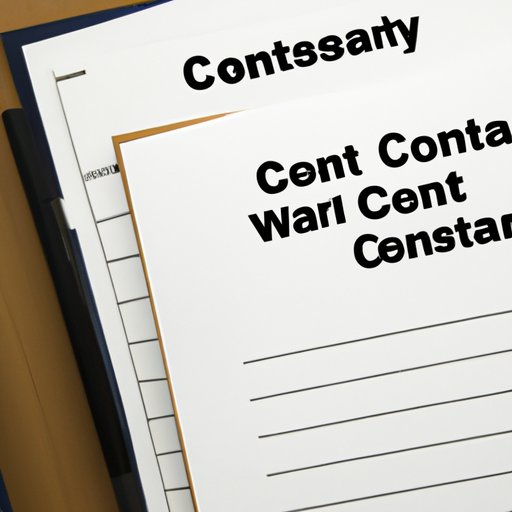Introduction
A warrant is a legal document issued by a judge or magistrate that authorizes the police to arrest an individual or search for specific items. In this article, we will explore how to see if there is a warrant out for your arrest. We will discuss researching local law enforcement websites for warrant information, contacting your local law enforcement agency for warrant status, using an online service to check for warrants, utilizing court records databases to look for warrants, seeking professional assistance from a lawyer and considering participating in a pre-trial diversion program.
Research Local Law Enforcement Websites for Warrant Information
The first step in determining if there is a warrant out for your arrest is to research local law enforcement websites. Many law enforcement agencies have websites that allow individuals to search for active warrants. The process for accessing these websites varies depending on the jurisdiction, but typically involves entering basic information such as name and address. Once the search is conducted, the website will provide information about any active warrants that are associated with the individual.
The information available on these websites may vary depending on the jurisdiction, but typically includes the date of the warrant, the type of offense, and the issuing agency. It may also include a description of the incident and the associated charges.

Contact Your Local Law Enforcement Agency for Warrant Status
If you are unable to find the information you need on a local law enforcement website, you can contact the agency directly. When contacting a local law enforcement agency for warrant status, it is important to provide as much information as possible. This may include your full name, date of birth, social security number, and any other identifying information. Be sure to give accurate information as providing false information could lead to criminal charges.
When contacting a local law enforcement agency for warrant status, you can expect to receive information about any active warrants that are associated with you. This may include the date of the warrant, the type of offense, and the issuing agency. You may also receive additional information, such as the amount of bail set for the warrant and instructions on how to resolve the warrant.
Use an Online Service to Check for Warrants
In addition to researching local law enforcement websites and contacting local law enforcement agencies, you can also use an online service to check for warrants. There are several online services available that allow individuals to search for active warrants. These services typically require a fee and may require providing personal information. It is important to be aware of the fees associated with the service and to read the terms and conditions carefully before signing up.
Using an online service to check for warrants has both advantages and disadvantages. On the one hand, it is convenient and allows you to quickly determine if there is a warrant out for your arrest. On the other hand, it may not always provide accurate information and there is no guarantee that the information will be up to date. Additionally, some services may charge a fee for each search, so it is important to consider the cost when deciding whether or not to use an online service.

Utilize Court Records Databases to Look for Warrants
Another option for checking for warrants is to utilize court records databases. These databases contain information about court proceedings, including warrants. To access these databases, you must typically register with the court and provide personal information such as your name, address, and date of birth. Once registered, you can search the database for any active warrants that are associated with you.
When using court records databases to look for warrants, you can expect to receive information about any active warrants associated with you. This may include the date of the warrant, the type of offense, and the issuing agency. It may also include additional information, such as the amount of bail set for the warrant and instructions on how to resolve the warrant.

Seek Professional Assistance from a Lawyer
It is important to remember that if you think there may be a warrant out for your arrest, it is important to seek professional advice from a lawyer. A lawyer can provide valuable guidance and help you understand your rights and options. They can also help you determine the best course of action for resolving any outstanding warrants.
To find a lawyer, you can ask family and friends for recommendations, search online directories, or contact your local bar association. It is important to take your time in selecting a lawyer and make sure they are experienced in dealing with warrants. You should also make sure to ask questions and get all the information you need before making a decision.
Consider Participating in a Pre-Trial Diversion Program
Finally, if you have an active warrant, you may want to consider participating in a pre-trial diversion program. Pre-trial diversion programs are alternative sentencing programs that allow individuals who have been charged with a crime to avoid prosecution and conviction. To participate in a pre-trial diversion program, individuals must typically agree to certain conditions, such as completing community service, attending counseling sessions, or paying restitution.
Participating in a pre-trial diversion program can be beneficial for those who wish to avoid a criminal record. However, it is important to keep in mind that pre-trial diversion programs are not available in every jurisdiction and may not be appropriate for everyone. Therefore, it is important to seek professional advice from a lawyer to determine if this is a viable option.
Conclusion
In conclusion, there are a variety of ways to determine if there is a warrant out for your arrest. Researching local law enforcement websites, contacting your local law enforcement agency, using an online service, utilizing court records databases, seeking professional assistance from a lawyer, and considering participating in a pre-trial diversion program are all options for determining if there is an active warrant associated with you. It is important to remember to seek professional advice from a lawyer if you think there may be a warrant out for your arrest. Additionally, taking steps to avoid future warrants, such as following the law and appearing in court when required, can help ensure that you do not have to worry about warrants in the future.
(Note: Is this article not meeting your expectations? Do you have knowledge or insights to share? Unlock new opportunities and expand your reach by joining our authors team. Click Registration to join us and share your expertise with our readers.)
